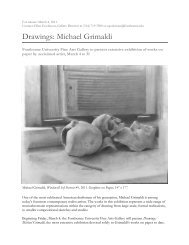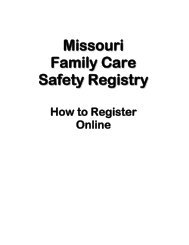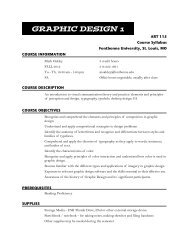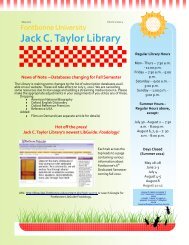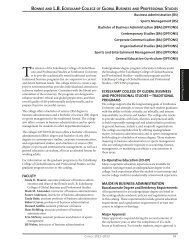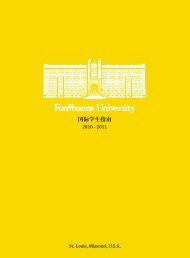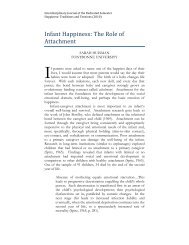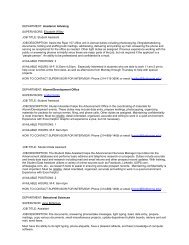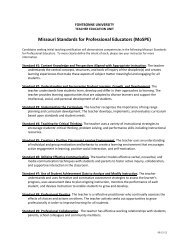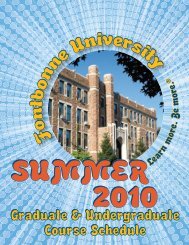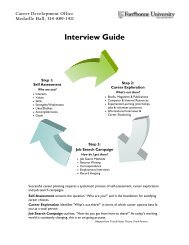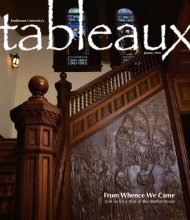Click here (pdf, 891.09KB) - Fontbonne University
Click here (pdf, 891.09KB) - Fontbonne University
Click here (pdf, 891.09KB) - Fontbonne University
You also want an ePaper? Increase the reach of your titles
YUMPU automatically turns print PDFs into web optimized ePapers that Google loves.
Ordinarily, the accused student and the Vice President for Student Affairs or designee<br />
will meet within five business days to discuss the complaint unless the circumstances are<br />
such that the Vice President for Student Affairs or designee determines that the meeting<br />
is not necessary. The accused will have an opportunity to respond to the complaint. At<br />
the conclusion of the investigation, the Vice President for Student Affairs or designee<br />
may determine that the accused violated or did not violate the Code of Student Character<br />
and Conduct. If the Vice President for Student Affairs or designee determines that the<br />
accused has violated the Code of Student Character and Conduct, the Vice President for<br />
Student Affairs or designee will determine appropriate sanctions against the accused.<br />
Any sanctions or other considerations will be provided to the accused in writing. In<br />
most cases, the complainant will not be informed of the outcome. If the Vice President<br />
for Student Affairs or designee determines that the accused has not violated the Code<br />
of Student Character and Conduct, the Vice President for Student Affairs or designee<br />
will so notify the accused.<br />
In some cases, it may be necessary for the Vice President for Student Affairs or designee<br />
to seek additional information before rendering a decision. The accused may be asked<br />
to be present at any subsequent meetings before a final decision is made.<br />
In some cases, the Vice President for Student Affairs or designee may determine to have<br />
the complaint against an accused student reviewed by a hearing committee, which shall<br />
then have the authority to determine whether or not an accused student has violated<br />
the Code of Student Character and Conduct. While the committee may also be asked<br />
to make a recommendation regarding sanctions, the Vice President for Student Affairs<br />
or designee will make the final decision on sanctions, if appropriate.<br />
The hearing committee shall consist of two students and three faculty or staff members,<br />
and alternates, who will be appointed by the Vice President for Student Affairs or<br />
designee as needed for a one year term. A chair shall be elected from the faculty or<br />
staff members. Hearings shall be conducted as follows:<br />
1. Hearings shall be conducted in private.<br />
2. Admission of any person to the hearing shall be at the discretion of the hearing<br />
committee chairperson.<br />
3. For charges involving more than one student, the chair of the hearing committee<br />
may permit separate hearings for each accused student.<br />
4. The accused student is responsible for presenting the student’s own case in a hearing.<br />
If the student so desires, an advisor from the faculty or staff, who is not serving<br />
on the committee, may be assigned to assist the accused student prepare for the<br />
hearing.<br />
5. The complainant, the accused and the hearing committee may present witnesses.<br />
6. The chair shall determine which records, exhibits, and written statements may be<br />
considered by the committee.<br />
7. All procedural questions are subject to the final decision by the chairperson.<br />
8. After the hearing, the hearing committee shall determine by majority vote if the<br />
student has violated one or more sections of the Code of Student Character and<br />
Conduct.<br />
9. The proceedings of the hearing committee will be recorded and transcribed. The<br />
record will be the property of <strong>Fontbonne</strong> <strong>University</strong>.<br />
C. Sanctions<br />
Any one or more of the following sanctions may be imposed upon any student found<br />
to have violated the Code of Student Character and Conduct:<br />
a. Warning. A notice in writing to the student that the student is violating or has<br />
violated institutional regulations.<br />
b. Disciplinary Probation. Probation is for a specified period of time and includes the<br />
probability of more severe disciplinary sanctions if the student is found to violate<br />
any institutional regulations during the probationary period.<br />
c. Loss of privileges. Denial of specified privileges for designated period of time.<br />
d. Fines.<br />
e. Restitution. Compensation for loss, damage or injury. This may take the form of<br />
appropriate service and/or monetary or material replacement.<br />
f. Education. The student may be asked to meet with a <strong>University</strong> official and/or<br />
attend a special program which addresses the behavior which led to the disciplinary<br />
action. The program could be sponsored or facilitated by a group off or on campus.<br />
g. Notification of Parent. Alcohol-related violations by an underage student are likely<br />
to be referred to the student’s parent(s) or guardian, and in some cases if the student<br />
is 21 years of age or older.<br />
h. Discretionary: Work assignments, community service, or other assignments related<br />
to the specific violation.<br />
i. Non-Academic Suspension. Separation of the student from <strong>Fontbonne</strong> for a<br />
definite period of time, after which the student may apply for readmission, subject<br />
to any specified conditions. If a suspended student violates or fails to meet the<br />
specified conditions for readmission, regardless of whether the student applies for<br />
readmission, the non-academic suspension may be converted to a non-academic<br />
dismissal by the Vice President for Student Affairs.<br />
j. Non-academic dismissal. A student may be dismissed from <strong>Fontbonne</strong> <strong>University</strong><br />
for a variety of non-academic offenses. These include, but are not limited to,<br />
behavior or attitudes unworthy of a good campus citizen or violation of any<br />
<strong>University</strong> policy.<br />
In addition to the sanctions listed above for individuals, groups found responsible for<br />
violating provisions of the Code of Student Character and Conduct may face deactivation<br />
and the loss of all privileges, including recognition and funding by <strong>Fontbonne</strong><br />
permanently or for a specified period of time.<br />
If the Vice President for Student Affairs or designee determines, during the course of<br />
an investigation of a complaint, that another student has more likely than not violated<br />
the Code of Student Character and Conduct (other than the student against whom a<br />
Conduct Complaint Form was originally filed), the Vice President for Student Affairs or<br />
designee may proceed with further investigation into the misconduct of that student, if<br />
the Vice President for Student Affairs or designee deems it necessary, or with making a<br />
determination and determining appropriate sanctions against the student, in accordance<br />
with the procedures set forth above.<br />
D. Appeals<br />
A. Determinations made by the Vice President for Student Affairs’ designee or by the<br />
hearing committee may be appealed by the accused student or by the complainant,<br />
as set forth below, to the Vice President for Student Affairs within five working days<br />
of a decision. Such appeals shall be in writing and delivered to the Vice President<br />
for Student Affairs.<br />
The Vice President for Student Affairs will review any such appeals by the accused<br />
or by the complainant according to the following criteria:<br />
1. To determine whether the original meeting with and/or investigation by the<br />
designee or hearing by the hearing committee was conducted fairly and in<br />
conformity with prescribed procedures.<br />
2. To consider new information, sufficient to alter a decision, not known at the<br />
time of the original meeting, investigation or hearing.<br />
36 37




